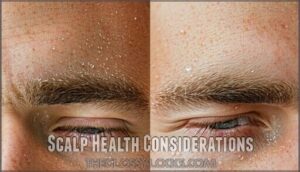This site is supported by our readers. We may earn a commission, at no cost to you, if you purchase through links.

Fine hair needs washing every 1-2 days since it gets greasy quickly.
Medium-textured hair can go 2-4 days between washes.
Thick, coarse hair only needs shampooing once a week because natural oils take longer to travel down the hair shaft.
Your scalp’s oil production, activity level, and styling products also influence frequency.
Over-washing strips natural oils, leading to dryness or increased oil production.
Under-washing causes buildup and odor.
Listen to your hair’s needs rather than following rigid schedules.
The sweet spot balances cleanliness with maintaining your hair’s natural protective barrier and peak health.
Table Of Contents
- Key Takeaways
- Hair Washing Frequency
- How Often Shampoo
- Shampooing Basics
- Hair Type Matters
- Signs of Over Washing
- Benefits of Less Shampoo
- Alternatives to Shampoo
- Seasonal Shampoo Adjust
- Shampooing Techniques
- Optimal Shampoo Schedules
- Frequently Asked Questions (FAQs)
- How often should you wash your hair if it’s fine?
- Is it good to shampoo your hair Everyday?
- How often do dermatologists recommend washing your hair?
- Is it okay if I shampoo my hair everyday?
- How often should you shampoo your hair to keep it healthy?
- What are the benefits of not washing your hair for a week?
- Is it OK to shampoo your hair 3 times?
- How often should you shampoo?
- How long should you use a hair shampoo?
- How often should you shampoo a dry scalp?
- Conclusion
Key Takeaways
- Wash fine or oily hair every 1-2 days, while thick or curly hair can go a week or longer without shampooing.
- Over-washing strips natural oils and leads to dryness, while under-washing causes buildup and odors—find your balance by observing your hair and scalp.
- Lifestyle factors like workouts, climate, and styling products influence how frequently you should shampoo.
- Use alternatives like dry shampoo or co-washing to extend time between washes and preserve natural oils.
Hair Washing Frequency
Your hair’s washing frequency isn’t a one-size-fits-all decision, as it depends on your hair texture, scalp’s oil production, and daily lifestyle habits.
Finding your perfect hair washing rhythm is like discovering your hair’s unique fingerprint—completely personal and beautifully yours.
Fine hair typically needs washing every other day, while thick or curly hair can go a week or longer between shampoos, which also depends on the scalp’s oil production.
Hair Texture Impact
Your hair texture plays a major role in determining your ideal hair washing frequency.
Fine hair tends to get oily quickly, requiring more frequent washes, while thick hair can go longer between shampoos.
Curly hair and coily hair types benefit from less washing since natural oils take longer to travel down textured strands.
Hair porosity also affects how your hair types retain moisture and oils, and understanding this can help in determining the best hair washing frequency.
Scalp Oil Production
Your scalp’s sebum secretion varies dramatically from person to person, creating unique hair washing frequency needs.
Gland activity fluctuates based on hormonal influence, genetics role, and diet impact.
Some people produce excess scalp oil within hours, while others maintain balanced oiliness for days.
Understanding your natural sebum production patterns helps determine ideal shampooing schedules for maintaining healthy scalp health without overwashing.
Lifestyle Factors
Beyond your scalp’s natural oil production, your daily routine shapes your shampoo frequency needs.
Activity levels matter – frequent workouts mean more washing. Climate impact plays a role too; humid environments increase oil buildup.
Your styling habits and product usage create residue requiring regular cleansing.
Age influence affects sebum production, with younger people typically needing more frequent washes than older adults, due to their natural oil and overall daily routine.
How Often Shampoo
Finding your perfect shampoo frequency isn’t one-size-fits-all. Your washing habits should match your hair’s unique needs and personal tolerance for oiliness.
Some people thrive shampooing daily, while others find success washing twice weekly. Cultural norms and lifestyle factors also influence how often you wash hair, but the key is listening to your scalp and strands.
Here’s how to determine your ideal hair washing frequency:
- Monitor your scalp’s oil production – Notice when your roots feel greasy or your hair looks flat
- Consider product buildup – Heavy styling products may require more frequent cleansing to prevent hair damage
- Assess your activity level – Regular workouts or humid environments might necessitate increased shampooing daily
Shampooing Basics
Your hair’s natural oils work as a protective barrier, but shampoo removes excess oil, dirt, and product buildup that can weigh down your strands and irritate your scalp.
Understanding how shampoo affects both your hair and scalp health helps you create a washing routine that keeps your hair clean without stripping away the moisture it needs.
Hair Health Importance
Regular hair washing plays a pivotal role in maintaining your hair’s overall vitality and appearance.
Proper shampoo frequency supports hair strength by removing buildup that weighs down strands, while promoting shine enhancement through clean, healthy follicles.
Balanced hair care prevents damage from accumulated oils and debris, ensuring growth stimulation occurs naturally.
Your scalp nourishment depends on finding the right washing rhythm for prime hair health.
Scalp Health Considerations
Your scalp’s microbiome thrives when you maintain proper sebum balance through appropriate shampoo frequency.
Dermatology experts emphasize that follicle health depends on removing buildup without stripping natural oils.
Too frequent hair washing disrupts your scalp’s ecosystem, while infrequent washing allows bacteria to flourish, causing dandruff and itchiness.
Finding the right balance promotes ideal scalp health and comfort.
Natural Oils Role
Your scalp produces sebum, a natural oil that acts as your hair’s built-in protection system.
This natural lubrication keeps your scalp hydrated while distributing oils down each strand for hair protection.
When you wash too frequently, you strip away this essential barrier, causing your scalp to overcompensate with increased sebum production.
Understanding hair natural oils helps determine your ideal hair washing frequency.
Hair Type Matters
Your hair’s unique characteristics determine how often you should reach for that shampoo bottle.
Fine, straight hair typically needs washing every day or two because it shows oil quickly.
Thick, curly, or coily hair can go a week or longer between washes since natural oils take more time to travel down the hair shaft, and this difference is due to the hair’s unique characteristics.
Oily Hair Needs
Your greasy strands aren’t just being dramatic—they’re dealing with sebum overproduction that demands attention.
Daily washing becomes necessary when hair oiliness creates visible buildup and scalp discomfort.
Clarifying shampoos effectively tackle product buildup while maintaining scalp health.
You’ll need consistent hair oil control strategies, as sebum accumulates faster on oily hair, requiring more frequent cleansing than other hair types.
Dry Hair Requirements
Dry hair craves gentle care and strategic shampoo frequency to maintain hair moisture.
Your dry hair wash routine should focus on oil retention rather than daily cleansing, which strips essential nutrients.
Consider these hydration methods for ideal scalp nourishment:
- Limit washing to 2-3 times weekly
- Choose sulfate-free formulas for product selection
- Apply deep conditioning treatments regularly
This approach supports damage prevention while preserving your hair’s natural protective barrier.
Curly Hair Considerations
Curly hair types demand special attention when determining shampoo frequency.
You’ll want to wash every two to three days to maintain curl definition while preventing product buildup.
Over-washing strips essential oils, leaving curls dry and frizzy.
Focus on hydration methods and gentle detangling techniques.
Consider protective styling between washes to preserve your curls’ natural pattern and reduce hair care maintenance.
Signs of Over Washing
Your hair and scalp will send clear signals when you’re washing too frequently, and recognizing these warning signs can help you adjust your routine before damage occurs.
Over-washing typically causes scalp irritation, excessive dryness, and paradoxically can trigger your scalp to produce even more oil as it tries to compensate for the stripped natural moisture, which can be a clear sign that you need to adjust your washing routine to prevent further damage.
Scalp Irritation Signs
Unfortunately, over-washing often triggers noticeable scalp irritation that you can’t ignore.
Itchiness causes include stripped natural oils, while redness factors stem from harsh chemical exposure.
Flaking reasons typically involve disrupted skin barrier function, and sensitivity triggers arise from frequent product contact.
These inflammation signs – including dandruff, scalp dryness, and seborrheic dermatitis symptoms – signal your washing routine needs adjustment.
Excessive Dryness Symptoms
Your hair might be crying out for moisture if you’re noticing telltale signs of excessive dryness.
Brittle Hair that snaps easily, Split Ends appearing more frequently, and overall Dullness signal you’re washing too often.
You’ll also experience Scalp Itch and Frizz Increase as natural oils get stripped away.
These hair damage symptoms indicate your shampoo frequency needs adjustment to prevent further hair dryness.
Increased Oil Production
Surprisingly, washing too often can trigger your scalp to produce even more sebum. When you strip away natural oils repeatedly, your scalp goes into overdrive to compensate.
This creates a frustrating cycle where oily hair seems worse despite frequent washing.
Watch for these sebum overproduction warning signs:
- Greasy roots within hours of washing
- Increased scalp itchiness from hormonal influence
- Heavy, weighed-down strands from sebum buildup
- Product buildup mixing with excess oils
Benefits of Less Shampoo
When you reduce your shampooing frequency, you’ll allow your hair’s natural oils to nourish and protect your strands from root to tip.
This approach helps maintain healthier hair texture, preserves color treatments longer, and prevents the dryness that comes from over-washing, which in turn supports the natural balance of your hair.
Natural Oil Preservation
When you reduce your shampoo frequency, you’re allowing your scalp’s natural sebum production to work its magic.
This natural oil distribution creates a protective barrier that maintains your hair’s elasticity and natural shine.
Your scalp microbiome stays balanced, supporting healthier hair growth.
Finding the right hair washing frequency for your hair type preserves these beneficial natural oils effectively, which is key to maintaining your hair’s natural shine.
Improved Hair Texture
Less frequent shampooing transforms your hair’s natural texture in remarkable ways.
When you reduce hair washing frequency, your strands develop better manageability and enhanced shine.
Your hair type responds positively to this gentler approach, creating noticeable hair texture variation.
Key improvements include:
- Hair Elasticity increases, reducing breakage during styling
- Manageability Boost makes detangling and styling easier
- Shine Enhancement develops as natural oils distribute evenly
- Volume Increase occurs as hair maintains its natural body
Color Retention Benefits
Frequent shampoo sessions strip away the protective oils that help your hair color stay vibrant longer.
When you reduce hair washing frequency, you’re giving your color longevity a fighting chance against fading.
Sulfate avoidance becomes easier too, since harsh detergents won’t constantly assault your strands.
This hydration importance extends root touch-ups, letting your hair care routine work smarter, not harder.
Alternatives to Shampoo
You don’t always need traditional shampoo to keep your hair clean and healthy. Several effective alternatives can help you extend time between washes while maintaining fresh, manageable hair.
Dry Shampoo Usage
Dry shampoo becomes your best friend when you’re stretching time between washes.
These oil-absorbing powders work by soaking up excess sebum at your roots, instantly revitalizing your hair cleansing routine. Choose formulas based on your hair type suitability – light sprays for fine hair, stronger formulas for thick strands.
Many users find product selection essential for ideal results.
Proper application techniques prevent product buildup while extending styles effortlessly, making dry shampoo a valuable tool for maintaining your hairstyle between washes, and ensuring you get the most out of your hair type and ideal results.
Co-washing Technique
Co-washing uses conditioner instead of traditional shampoo for your hair cleansing routine.
This conditioner cleansing method works well for curly and dry hair types.
Choose sulfate-free products designed for co-washing.
Apply conditioner to wet hair, perform gentle scalp massage, then rinse thoroughly.
Co-wash benefits include moisture retention and reduced frizz.
Consider using a specialized cleansing product for best results.
Technique variations depend on your specific hair care routine needs.
Scalp Exfoliation Methods
Physical scrubs and chemical exfoliants offer effective scalp cleansing beyond regular hair washing frequency.
You can massage sea salt or sugar-based DIY recipes into your wet scalp monthly, or try scalp brushes with your usual shampoo.
These hair washing tips provide exfoliation benefits by removing buildup and dead skin cells.
For a deeper cleanse, consider using a specialized scalp scrub.
Hair exfoliation improves circulation and enhances your overall scalp health naturally.
Seasonal Shampoo Adjust
Your hair’s washing needs change with the seasons, and adjusting your shampoo frequency can help maintain healthier hair year-round.
Cold weather typically dries out your scalp and may require more frequent washing to prevent dandruff, while summer’s humidity often allows you to wash less frequently and let natural oils protect your strands, which can help maintain healthier hair.
Winter Shampoo Schedule
Winter dryness demands seasonal adjustments to your shampoo schedule.
Cold air strips moisture from your scalp, reducing natural oil production and creating static-prone hair.
Most hair types benefit from washing every three to four days during winter months.
This approach prevents product buildup while maintaining scalp hydration.
Dry hair especially thrives with less frequent shampooing, allowing natural oils to combat harsh weather conditions, which is crucial for natural oil production.
Summer Shampoo Frequency
Summer heat changes your shampoo frequency needs dramatically.
Sweat buildup from higher temperatures means you’ll likely wash more often than winter months.
UV exposure and chlorine effects from pools can dry your hair, while increased product usage for styling requires regular cleansing.
Your hair type still matters – oily hair wash schedules may shift to daily, while scalp hydration becomes essential for maintaining healthy hair washing habits.
Humidity Considerations
High humidity throws your hair’s washing routine a curveball.
When moisture-heavy air meets your strands, it changes how often you should shampoo based on your hair type and scalp’s response.
Here’s how humidity impacts your shampoo frequency:
- Oily hair wash schedules need adjustment – humid climates can make scalp moisture production unpredictable
- Frizz control becomes priority – washing less preserves natural oils that combat humidity
- Product buildup accelerates – sweat impact increases in muggy weather
- Hair types react differently – curly hair benefits from reduced washing frequency
Shampooing Techniques
You’ll get better results from your shampoo routine when you focus on proper technique rather than just frequency.
The way you massage your scalp, rinse your hair, and apply conditioner can make the difference between healthy, clean hair and hair that’s damaged or still dirty after washing.
Massaging Scalp
Proper scalp massage transforms your hair washing routine from mundane to therapeutic.
Gentle circular motions with your fingertips release massage benefits including circulation boost and dandruff reduction.
This technique promotes hair growth while enhancing product absorption.
| Massage Technique | Benefits |
|---|---|
| Light circular motions | Stimulates blood flow |
| Fingertip pressure | Removes dead skin cells |
| 2-3 minute duration | Maximizes hair washing benefits |
Rinsing Thoroughly
After shampooing, thorough rinsing removes residue buildup that can weigh down your strands. Water temperature matters – lukewarm water opens cuticles for better cleaning without damage.
- Rinse duration: Spend 30-60 seconds ensuring complete product removal
- Scalp stimulation: Massage gently while rinsing to boost circulation
- Water pressure: Use moderate flow to avoid tangling
- Final cool rinse: Seals cuticles for added shine
Conditioning Importance
After thorough rinsing, you’ll want to apply conditioner to lock in moisture and protect your strands.
Conditioner benefits include detangling hair, moisture retention, and split end prevention while delivering enhanced shine.
Choose a formula that matches your specific hair type, as different hair types require varying levels of hydration, and this simple step transforms your hair health and elevates your overall hair care tips routine.
Optimal Shampoo Schedules
Your hair’s ideal washing schedule depends on several key factors including your hair type, scalp oil production, and lifestyle habits.
Finding the right balance between daily, weekly, and bi-weekly shampooing can help you maintain healthy hair while avoiding the damage that comes from over-washing or under-washing, which is crucial for maintaining lifestyle habits.
Daily Shampooing Risks
Washing hair daily might seem like the cleanest approach, but it can backfire on your hair health.
Daily shampooing strips away natural oils faster than your scalp can replace them, leading to several unwanted consequences:
- Hair Damage from constant chemical exposure weakens strands
- Color Fading accelerates when harsh shampoo ingredients wash over treated hair
- Scalp Irritation develops from over-cleansing sensitive skin
- Moisture Loss causes hair breakage and dullness over time
Weekly Shampooing Benefits
Once-a-week shampooing offers remarkable advantages for your hair’s overall well-being.
This hair washing frequency promotes ideal scalp health by allowing natural oils to distribute evenly throughout your strands.
Your hair type benefits from reduced breakage and improved hair strength when you limit shampoo sessions.
Weekly washing creates a healthy hair routine that delivers a significant manageability boost while preserving your hair’s natural protective barrier, which is essential for overall well-being.
Bi-weekly Shampooing Advantages
Most people discover that bi-weekly hair washing habits create a healthier scalp microbiome while dramatically improving hair hydration.
This extended shampoo schedule reduces breakage by preserving natural oils and enhances color longevity for treated hair.
You’ll notice significant cost savings on products too. However, determining how often to wash hair depends on your hair washing frequency needs and lifestyle factors.
Frequently Asked Questions (FAQs)
How often should you wash your hair if it’s fine?
Fine hair shows oil buildup faster than thicker textures, so you’ll need to shampoo every other day or daily.
Your strands lack volume to hide grease, making frequent washing essential for maintaining a fresh, clean appearance.
Is it good to shampoo your hair Everyday?
Shampooing daily isn’t ideal for most hair types.
It can strip natural oils, leaving hair dry and damaged.
Exceptions include oily scalps or daily workouts.
Instead, aim for every 2-3 days for balance.
How often do dermatologists recommend washing your hair?
Experts say your scalp produces about 1-2 grams of oil daily.
Dermatologists generally recommend washing 2-3 times per week, but your hair type, activity level, or oiliness might call for more or less frequent shampooing.
Is it okay if I shampoo my hair everyday?
It’s fine to shampoo daily if you’ve got oily hair, sweat often, or use styling products regularly.
Just use a gentle shampoo to avoid stripping natural oils and drying out your scalp.
How often should you shampoo your hair to keep it healthy?
To keep your hair healthy, wash it based on texture and lifestyle.
Oily or fine hair might need daily washing, while thicker, curly hair can thrive with weekly washes.
Adjust for sweat, styling, and personal comfort.
What are the benefits of not washing your hair for a week?
Skipping hair washing for a week lets your scalp’s natural oils nourish your hair, reducing dryness and breakage.
It can also save time, protect color treatments, and promote healthier scalp balance over time.
Is it OK to shampoo your hair 3 times?
Yes, it’s fine to shampoo 3 times, but it depends on your hair type and needs.
Over-washing can strip natural oils, so keep an eye on dryness or irritation to stay balanced.
How often should you shampoo?
Think of your hair as a garden—it needs care, but not too much.
Shampoo every 2-3 days if you’ve oily hair, weekly for dryness, or adjust based on texture, lifestyle, and scalp needs.
How long should you use a hair shampoo?
You can use the same shampoo until it no longer suits your hair or scalp.
If you notice dryness, excess oil, or irritation, it’s probably time to switch to a more suitable option.
How often should you shampoo a dry scalp?
Picture a crisp morning where your scalp feels parched, craving hydration.
For a dry scalp, shampoo once or twice a week.
Use a nourishing formula to retain moisture and prevent further dryness or irritation, which can be a complete solution for hydration.
Conclusion
Striking the perfect balance between a fresh feel and healthy hair can be tricky.
Washing too often strips natural oils, while too little causes buildup and odor.
How frequently should you shampoo your hair? It depends on your hair type, lifestyle, and scalp’s needs.
Fine hair may need frequent washes, while thick or curly hair thrives on less.
Listen to your hair—it knows best, and adjust your routine to maintain cleanliness, protect natural oils, and guarantee superior hair health.
- https://hudsondermlaser.com/
- https://www.instagram.com/angelacstyles/
- https://www.ncbi.nlm.nih.gov/pmc/articles/PMC8138261/
- https://www.mayoclinic.org/biographies/davis-dawn-marie-r-m-d/bio-20054974?mc_id=us&utm_source=newsnetwork&utm_medium=l&utm_content=content&utm_campaign=mayoclinic&geo=national&placementsite=enterprise&invsrc=other&cauid=100721
- https://youtu.be/B_0XPmjwVsY
















